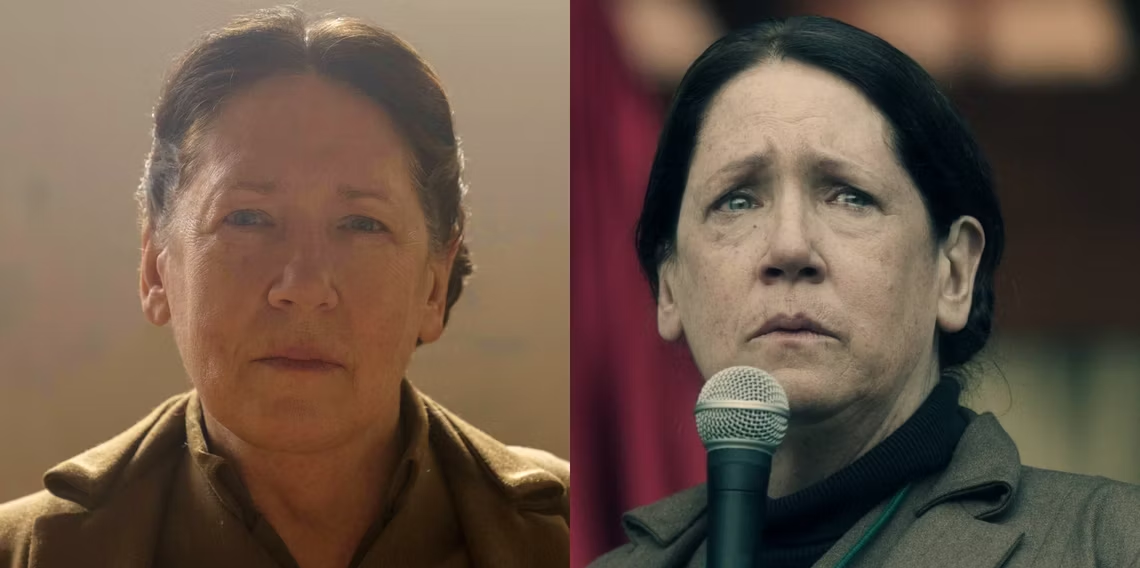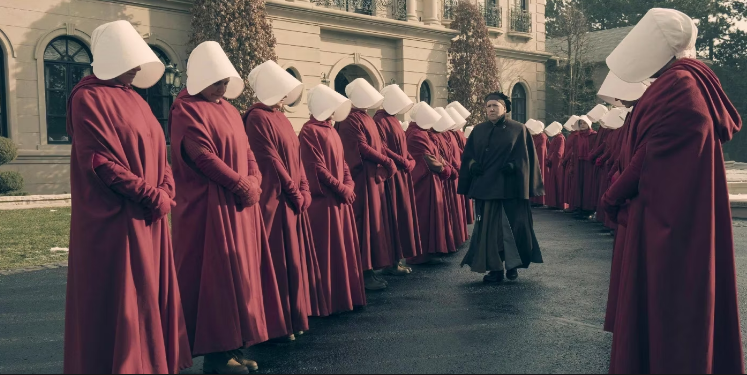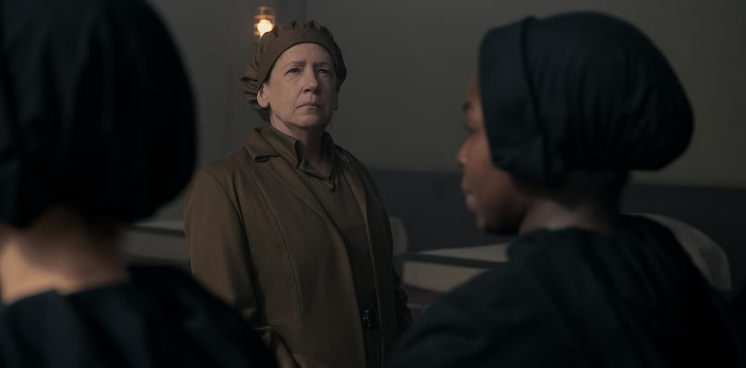The Handmaid’s Tale: 11 Things You Never Noticed About Aunt Lydia
Lydia Clements has been an important part of The Handmaid’s Tale since the first episode, but there are subtle details about her fans might miss.

The Handmaid’s Tale is a pretty dark and dystopic show, and the routine dreadful behavior of Aunt Lydia only enhances the misery — here are 11 things viewers may not know about Aunt Lydia from The Handmaid’s Tale. Set in a dystopian future, The Handmaids Tale sees women forced to live as concubines under a theocratic regime known as Gilead. Lydia Clements, a religious school teacher turned theocrat who is responsible for keeping the Handmaids in check, has been an important part of the series since the first episode. However, the show hasn’t offered an enormous amount of insight as to how Lydia became who she is now.
The Handmaid’s Tale season 3 episode “Unfit” finally gave viewers a look into Lydia’s past, showing a bit of her pre-Gilead experiences through her own eyes. Aunt Lydia is undoubtedly one of the most terrifying and interesting characters in the series, but some of the details about this brutal handmaid wrangler are easy to miss. Aunt Lydia from The Handmaid’s Tale has gone through an astounding arc on the series, and will also feature in the spinoff The Testaments after its parent series ends with season 6. Here are eleven things revealed about Aunt Lydia that have gone unnoticed by audiences.
11. She’s Unpopular Despite Her Power

The Handmaid’s Tale has never been shy about making it clear how disliked Aunt Lydia is among the handmaids and even among the Commanders and their wives, but it did come as a surprise to see how unpopular she was among the other Aunts as well. Aunt Lydia from The Handmaid’s Tale might be high-ranking in terms of her legal status, but it’s clear that her coworkers have very little appreciation for her, and she seems to be universally disliked in Gilead’s society. It will be interesting to see if that ever comes into play later on in the series or in The Testaments.
10. Lydia Was A Family Court Lawyer Before Gilead

Long before Gilead took control of the United States, Aunt Lydia from The Handmaid’s Tale used to be a family lawyer. In the episode “Unfit”, it was shown that prior to becoming a fourth-grade school teacher, she used to practice family law before the privatization of the industry. She explained that when she used to practice, the work was really frustrating, as she could not help as many children as they wanted to, which possibly meant that separating children from their parents and handing them over to foster care was not as easy then.
9. She Has A Failed Marriage

Aunt Lydia from The Handmaid’s Tale was married long before Gilead, but according to her, it was a mistake. She believes she married the wrong person. Considering how insecure Aunt Lydia is and how she enjoys torturing and finding scapegoats, it’s not hard to imagine what might have happened between them and who might have been the toxic one in the relationship. Lydia admits to Noelle that she had been married before and that the relationship ultimately failed. It would be fascinating to have a closer look into that experience though, as Lydia’s status within Gilead indicates that it couldn’t have ended in a simple but “sinful” divorce.
8. Aunt Lydia Is Literally An Aunt

Although Aunt Lydia from The Handmaid’s Tale only mentioned it very briefly, she revealed in a season 2 conversation with June that she was actually the godmother to her sister’s son, but he died in infancy. This paints her character in a more interesting light. While this is obviously mere speculation, it’s likely that this unimaginable loss had a huge impact on her religious zealotry and her obsession with children being born at any cost. That certainly doesn’t justify her behavior, but it could at least explain why she is one of the few who seems truly faithful to Gilead.
7. Her Name Is Ironic

In the earlier portion of the series, Aunt Lydia from The Handmaid’s Tale was mostly a mystery. Viewers didn’t know her backstory, nor did they even know her last name. But, it’s nearly certain that she was given the surname “Clements” as an ironic nod to her characterization. The name Clements and names similar to it share the same root word of “clemency,” a word that means mercy, gentleness, and lenience. Given Lydia’s incredibly cruel behavior towards the handmaids, she clearly couldn’t be further removed from the name that she was born with. However, she does begin to show a change of heart as time goes on.
6. She’s Too Good To Be Killed Off

While Emily stabbed the knife into Aunt Lydia’s back, she was always destined to defy death, as it was Margaret Atwood’s demand. In an interview with ITV, Ann Dowd said that the author told the showrunners to let Lydia survive, saying that she is too good of a character to be killed off. While Aunt Lydia from The Handmaid’s Tale is a constant source of torture, she has also been a consistently fascinating character, with glimpses of her vulnerability and affection towards the handmaids peeking through the violence she indulges in. Given how masterful Dowd’s performance has been, it comes as no surprise that the series kept her around.
5. Her Future According To The Books Is Shocking

Although Margaret Atwood told the show’s writers that Aunt Lydia from The Handmaids Tale was simply too good to get rid of, it’s possible that she just didn’t want to spoil a big twist in her sequel book, The Testaments. Because not only does Lydia play a large role in the book itself (as she will in The Testaments show too), but her character arc is pretty surprising. Despite seeming to be a true believer at the start of the story (at least in June’s eyes, indicating that she might not always be a reliable narrator), Lydia is actually a part of Mayday, working against Gilead in the long game.
4. She’s Close To Turning On Gilead

Although Aunt Lydia’s defection to Mayday is still an unexpected twist in her character development, it would have been even more surprising earlier on in The Handmaid’s Tale TV series. However, lately, it seems obvious that she is dissatisfied with the way that Gilead is functioning, and she even seems to be actively working against some people in power now. Lydia from The Handmaid’s Tale is still far from the rebel that June has become, but it seems like the show is working towards making Lydia into the character readers see in The Testaments.
3. The Driving Force Behind Her Violence

After being stabbed by Emily in season 2, Aunt Lydia goes to visit June at Lawrence’s house. She wants to visit June’s room to ensure everything is alright, which is ironically what she was doing with Emily right before getting stabbed. She obviously is struggling to walk upstairs in her condition, and when June offers to help, Lydia from The Handmaid’s Tale lashes out and attacks her with a taser. While she gives a make-do reason about her gossiping at Loaves and Fishes, the real reason might be that she fears being seen as helpless, which could negatively affect her position in the ever-tenuous Gilead social structure.
2. She Might Be Lying About Crimes And Punishments

Although this is only a significant plot point in the book, interestingly, Ofglen recognizes a Guardian who is being Salvaged in a Particicution as a Mayday rebel. However, he is ostensibly being killed for the crime of raping a pregnant handmaid who then lost her baby as a result. Ofglen’s connection to this man isn’t included in the TV series, but the fact that this incredibly specific crime and punishment was written into the show, it’s a hint that Aunt Lydia from The Handmaid’s Tale quite possibly isn’t being honest about what these people are being executed for.
1. She Likely Knows The Parentage Of Gilead’s Children

This is yet another world-building aspect that was clarified in the sequel book to The Handmaid’s Tale, The Testaments, but it provides an interesting insight into Lydia from The Handmaid’s Tale and the rest of the Aunts. Although children are considered to be the legal offspring of certain commanders and wives, the Aunts actually know who the real parents of these kids are. Given how few people in Gilead are capable of procreating, the Aunts clandestinely keep track of the children’s true biological lineage to ensure that no one winds up married to their genetic relatives in future generations.


